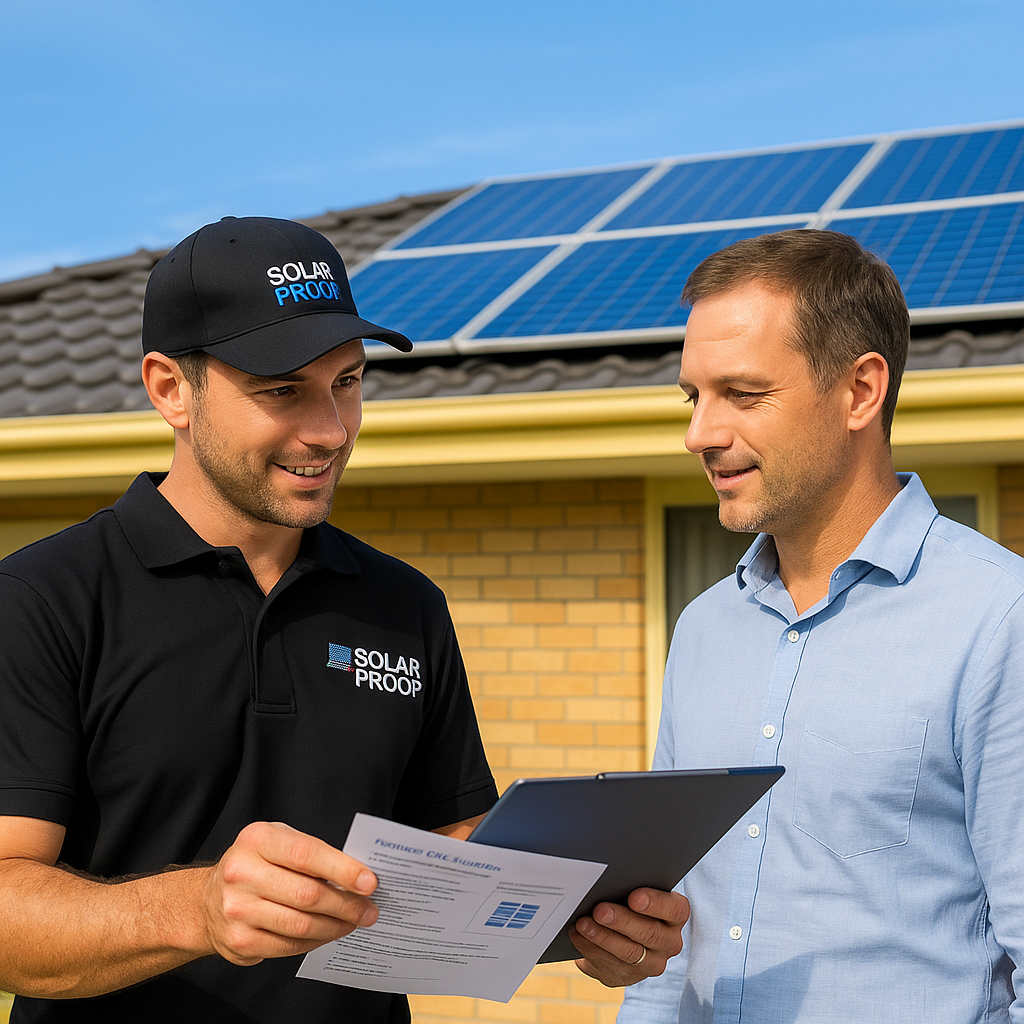Choosing a solar installer is one of the most important decisions you’ll make when going solar. After all, even the best panels won’t perform well if they’re installed incorrectly.
Unfortunately, not all solar companies play by the rules. Some offer cheap deals with poor-quality components or disappear when problems arise. The good news? Spotting a trusted solar installer isn’t hard — if you know what to look for.
Here’s how to make sure your solar system is installed by professionals who deliver quality, safety, and long-term reliability.
1. Check for Clean Energy Council (CEC) Accreditation
The very first thing to look for is CEC accreditation. This is the Australian standard for professionalism and safety in the solar industry. Only CEC-accredited installers can legally connect systems to the grid and claim government rebates.
To verify an installer’s accreditation, visit the official site:
Clean Energy Council – Find an Installer
If an installer can’t show their accreditation or doesn’t appear on the CEC database, walk away. Accreditation guarantees that the installer:
- Meets Australian standards for design and installation
- Uses approved products
- Provides correct system documentation for rebates
Tip: Ask to see their accreditation number — a professional will happily provide it.
2. Look for Local Experience and Proven Projects
A trusted solar installer should have a track record of successful installations in your region. Local experience matters because every area has unique conditions — from roof types to sunlight angles and council requirements.
Before committing, ask:
- How long have you been installing in this area?
- Can I see photos or addresses of previous jobs?
- Do you offer ongoing support and maintenance?
Experienced installers understand local rebate programs, weather patterns, and grid connection rules. Plus, local companies are easier to contact if you need warranty support later.
3. Read Reviews and Real Customer Feedback
Online reviews can reveal a lot about an installer’s reputation. Look for consistent positive feedback mentioning:
- Timely installation
- Good communication
- Clean workmanship
- Post-installation support
You can check Google Reviews, Facebook pages, and platforms like SolarQuotes or ProductReview.
However, be cautious of reviews that look too perfect or repetitive — these may be paid or fake. Reliable installers have authentic testimonials that sound human and detailed.
4. Ensure They Provide Detailed, Transparent Quotes
A trustworthy installer provides a clear and itemised quote, not just a total price. The quote should include:
- Solar panel brand and model
- Inverter type (e.g., Fronius, Sungrow, SolarEdge)
- Battery details (if included)
- System size and expected annual output
- Total price with STC rebates applied
- Warranty coverage (panels, inverter, and labour)
Transparency shows professionalism. If an installer avoids giving details or pressures you to sign quickly, that’s a red flag.
Pro Tip: Compare several verified quotes before deciding — it helps you identify fair pricing and avoid hidden costs.
Compare accredited installers now: Request Solar Quotes
5. Verify Product Quality and Warranties
Even with a skilled installer, poor-quality equipment can lead to early failures. A trusted solar installer will only use CEC-approved products from reputable brands.
Ask about:
- Panel efficiency and degradation rate
- Inverter warranty (10 years minimum recommended)
- Battery warranty (10–15 years or more)
- Workmanship guarantee (5–10 years)
They should also explain how to claim warranties if issues occur. A company that manages warranty claims directly offers stronger long-term support.
6. Confirm They Handle Rebates and Paperwork
Solar installation involves several steps — including government rebates, grid connection, and system registration. Reliable installers handle these for you, ensuring everything is lodged correctly.
A professional installer will:
- Prepare and submit STC rebate forms
- Coordinate grid-connection approval with your energy provider
- Provide compliance certificates and manuals after installation
This not only saves you time but also ensures your system qualifies for financial incentives.
7. Ask About After-Sales Service
Many homeowners don’t realise that after-sales support is just as important as installation quality. A trusted installer won’t disappear once the job’s done.
Instead, they’ll offer:
- Regular maintenance or inspection packages
- System performance monitoring tools
- A dedicated service line for troubleshooting
If your system underperforms, you’ll want to know you can reach the same people who installed it — quickly.
8. Trust Your Gut — and the Details
Finally, trust your instincts. If an installer avoids questions, provides vague information, or pressures you to sign “today only” deals, that’s a warning sign.
Good installers are confident in their work and will encourage you to review everything carefully. They’ll explain technical terms clearly and never rush you into decisions.
Your Next Steps
Selecting a trusted solar installer ensures your investment pays off for decades. By checking accreditation, verifying experience, and comparing transparent quotes, you’ll avoid unreliable operators and protect your savings.
✅ Step 1: Verify credentials → Clean Energy Council – Find an Installer
✅ Step 2: Compare accredited installer quotes → Request Solar Quotes
When you take these steps, you’ll enjoy peace of mind knowing your solar system is designed, installed, and supported by professionals who care about quality and performance.

